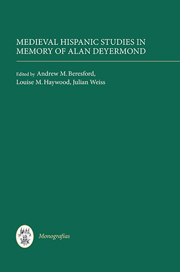Book contents
- Frontmatter
- Contents
- Contributors
- Foreword: Alan Deyermond: A Memoir
- Acknowledgments
- Abbreviations
- Introduction: Alan Deyermond, 1932–2009
- 1 Sanctity and Prejudice in Medieval Castilian Hagiography: The Legend of St Moses the Ethiopian
- 2 The Image of the Phoenix in Catalan and Castilian Poetry from Ausiàs March to Crespi de Valldaura
- 3 On the Frontiers of Juan Rodríguez del Padrón's Siervo libre de amor
- 4 Memory as Mester in the Libro de Alexandre and Libro de Apolonio
- 5 Advancing on ‘Álora’
- 6 Time is of the Essence: Essence, Existence, and Reminiscence in Two Portuguese Poets
- 7 Gómez Manrique's Exclamación e querella de la governación: Poem and Commentary
- 8 The Misa de amor in the Spanish Cancioneros and the Sentimental Romance
- 9 ‘Manus mee distillaverunt mirram’: The Essence of the Virgin and an Interpretation of Myrrh in the Vita Christi of Isabel de Villena
- 10 ‘Nos soli sumus christiani’: Conversos in the Texts of the Toledo Rebellion of 1449
- 11 Vernacular Commentaries and Glosses in Late Medieval Castile, II: A Checklist of Classical Texts in Translation
- 12 Games of Love and War in the Castilian Frontier Ballads: El romance del juego de ajedrez and El romance de la conquista de Antequera
- 13 ‘Esta tan triste partida’ (Conde Dirlos, v. 28a): maridos y padres ausentes
- Index
- Tabula in memoriam
5 - Advancing on ‘Álora’
Published online by Cambridge University Press: 05 May 2013
- Frontmatter
- Contents
- Contributors
- Foreword: Alan Deyermond: A Memoir
- Acknowledgments
- Abbreviations
- Introduction: Alan Deyermond, 1932–2009
- 1 Sanctity and Prejudice in Medieval Castilian Hagiography: The Legend of St Moses the Ethiopian
- 2 The Image of the Phoenix in Catalan and Castilian Poetry from Ausiàs March to Crespi de Valldaura
- 3 On the Frontiers of Juan Rodríguez del Padrón's Siervo libre de amor
- 4 Memory as Mester in the Libro de Alexandre and Libro de Apolonio
- 5 Advancing on ‘Álora’
- 6 Time is of the Essence: Essence, Existence, and Reminiscence in Two Portuguese Poets
- 7 Gómez Manrique's Exclamación e querella de la governación: Poem and Commentary
- 8 The Misa de amor in the Spanish Cancioneros and the Sentimental Romance
- 9 ‘Manus mee distillaverunt mirram’: The Essence of the Virgin and an Interpretation of Myrrh in the Vita Christi of Isabel de Villena
- 10 ‘Nos soli sumus christiani’: Conversos in the Texts of the Toledo Rebellion of 1449
- 11 Vernacular Commentaries and Glosses in Late Medieval Castile, II: A Checklist of Classical Texts in Translation
- 12 Games of Love and War in the Castilian Frontier Ballads: El romance del juego de ajedrez and El romance de la conquista de Antequera
- 13 ‘Esta tan triste partida’ (Conde Dirlos, v. 28a): maridos y padres ausentes
- Index
- Tabula in memoriam
Summary
Alan Deyermond and I took different views over some points in the interpretation of the ballad of ‘Álora la bien cercada’, which occupied us on a number of train journeys into London in the early 1990s, although naturally we found common ground on some other aspects of it. The relevant paragraphs in his 1996 Kate Elder lecture at Queen Mary and Westfield College, as it then was, now constitute, alas, his final major contribution to the extensive commentary which this intriguing text has attracted, although brief observations also occur in later contexts (Deyermond 2001: 68). In returning to ‘Álora’ (Smith 1965: no. 34) to honour the memory of a scholar both versatile and generous, I offer here some material drawn from late medieval Spanish texts which may assist us further in approaching the ballad insofar as it suggests how some aspects of the work's content might have had particular resonances for at least some medieval audiences during the period from 1482 until the end of the century, but also possibly at other times both earlier and later. This paper, therefore, juxtaposes two factual data sets and then draws attention to some conclusions which may be thought to suggest themselves as possibilities in the light of that juxtaposition.
- Type
- Chapter
- Information
- Medieval Hispanic Studies in Memory of Alan Deyermond , pp. 121 - 138Publisher: Boydell & BrewerPrint publication year: 2013



